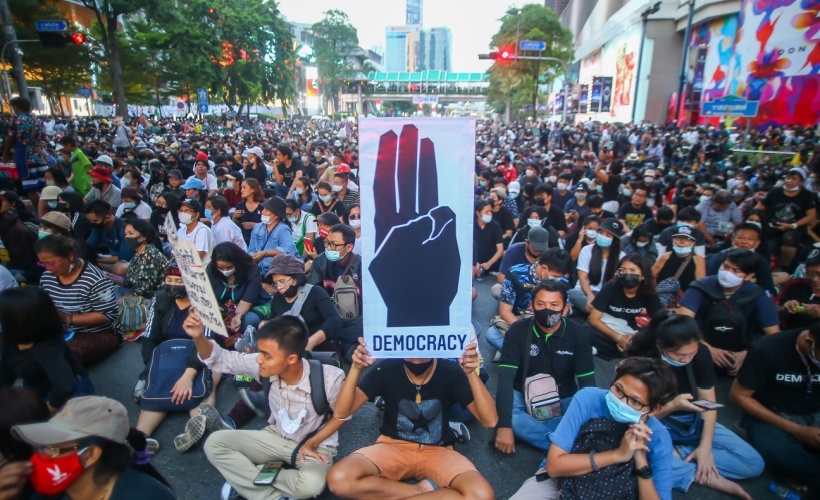For this online event, our panelists will present on the topic of ‘The Future of the Pacific Regional Order’. With rising geopolitical competition, the deteriorating climate crisis, and ever-pressing development needs, the question of how Pacific Islands states should cooperate internally and with external partners is of paramount importance. The presentations will be followed by an audience Q&A.
Panelists:
Anna Powles is an Associate Professor with the Centre for Defence and Security Studies at Massey University, in Aotearoa New Zealand. She specialises in geopolitical dynamics in the Pacific, Pacific security architecture, security cooperation in the Pacific, conflict and non-state actors in the Pacific, and New Zealand foreign and defence policy. Her research has appeared in journals including International Affairs, Asia Policy, International Relations of the Asia-Pacific and Georgetown Journal of Asian Affairs; she has edited several books and authored multiple book chapters and commissioned policy research for the Lowy Institute for International Affairs, Australian Strategic Policy Institute, RAND, the National Bureau for Asian Research and RUSI. In 2014 she founded Women in International Security New Zealand and was the NATO New Zealand civil society representative. Before joining academia, she worked in complex humanitarian emergencies and security sector reform with the United Nations, INGOs and the International Crisis Group. She is a regular op-ed contributor to publications including The Interpreter, East Asia Forum, The Conversation and The Strategist.
Professor Yvonne Te Ruki Rangi o Tangaroa Underhill-Sem, MNZM, is a Cook Island New Zealander with close family ties to PNG. She is a Pacific feminist decolonial development geographer currently working at the University of Auckland where she teaches Pacific Studies, Gender Studies and Development Studies. The intricacies of mobilities, maternities and markets in a warming world continue to catch her attention as she works to resist the erasure of diversity within colonial differences. Yvonne is currently involved in a research project on climate mobility in 18 communities across 7 countries in the Pacific. Issues of security emerge throughout this research, as well as her other research grounded in Pacific feminist analysis. In 2022, she was awarded the Metge Medal from the Royal Society of New Zealand in recognition of her intellectual leadership on gendered social relations which have transformed development as accepted practice in Aotearoa and the Pacific. Yvonne is also actively involved in Pacific civil society as the Co-Chair of Oxfam in the Pacific, Board member of Pacific Feminist Fund and member of the Tok Save Pacific Gender Research portal Steering Committee.
Professor David Peebles has been passionately engaged with the Pacific academically and professionally for almost 30 years. Professor Peebles worked for the Office of the Pacific in the Australian Department of Foreign Affairs, where he was responsible for some of the most critical Pacific strategic issues, including climate change and oceans, the Pacific Islands Forum and Australia’s overall Pacific policy. As part of his Australian diplomatic career, Professor Peebles served as the Deputy High Commissioner in Solomon Islands, Minister Counsellor in Indonesia and as a peace monitor in Bougainville as part of the regional peace monitoring group. He has also served as a Senior Adviser on Overseas Aid and Pacific Island Affairs at the Australian Parliament House. Professor Peebles is the author of Pacific Regional Order which considered how Pacific regional cooperation could further deepen.
Steven Ratuva is the Pro-Vice Chancellor, Pacific as well as Distinguished Professor and Director of the Macmillan Brown Center for Pacific Studies. He is Fellow of the Royal Society of New Zealand and Chair of the International Political Science Association research committee on Climate Security and Planetary Politics. Steve is also member of a number of public boards including the Royal Society Te Apārangi, Climate Change Commission, Independent Accountability Group of the Human Rights Commission, and PBRF Sector Reference Group, to name a few. He has had extensive international engagement as consultant or advisor to UNDP, World Bank, Asian Development Bank, Pacific Island Forum, Commonwealth Secretariat, International Labour Organization and others. He is an interdisciplinary researcher whose academic interest spans a number of disciplines including sociology, social anthropology, development studies, political science and history. He has led a number of international research and project teams on global ethnicity, global security, and climate security, amongst others.
Chair:
John Nilsson-Wright (formerly Swenson-Wright) is an associate professor at the Faculty of Asian and Middle Eastern Studies (FAMES), University of Cambridge and an official fellow at Darwin College. He is a graduate of Christ Church and St. Antony’s College, Oxford, and SAIS Johns Hopkins University. He was head of the Chatham House Asia Programme from March 2014 to October 2016 and has also been the senior research fellow for Northeast Asia and Korea Foundation Fellow with Chatham House’s Asia-Pacific Programme. He is also a non-resident fellow at the Sejong Institute in Seoul, Republic of Korea; senior non-resident fellow at the Korea Centre, East Asia Institute, National University of Singapore (NUS); and a non-resident fellow at the Centre for North Korean Studies at the University of Vienna. His research focuses on Cold War history including US-Japan alliance ties, and the contemporary international relations and politics of Northeast Asia, with reference to Japan and the Koreas. In his policy work, he focuses on regional security and the changing nature of alliance relations in East Asia. He is currently writing a monograph on populism and identity politics as a contemporary and historical phenomenon in both Europe and Northeast Asia.
This event is being co-organised with the East-West Center in Washington.







